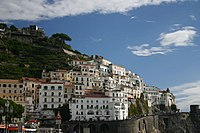This article has multiple issues. Please help improve it or discuss these issues on the talk page. (Learn how and when to remove these messages)
|
| Admiralty law |
|---|
| History |
| Features |
| Contract of carriage/Charterparty |
| Parties |
| Judiciaries |
| International conventions |
|
| International organizations |
The Amalfian Laws are a code of maritime laws compiled in the 12th century in Amalfi, a town in Italy.
They took the form of the Tabula Amalfitana (Amalfi's Board), and were for centuries the international mercantile code accepted and taken as a model.
The Laws of Amalfi, also known as the Amalphitan Code, were a set of maritime laws created in the 11th century in the town of Amalfi, Italy. These laws were used to regulate trade and shipping in the Mediterranean Sea.
For example, one of the laws stated that if a ship was damaged during a storm, the crew and cargo should be saved before the ship itself. This was to ensure the safety of human life and valuable goods.
Another law stated that if a sailor was injured while working on a ship, they were entitled to compensation from the ship's owner. This was to protect the rights and well-being of the sailors who risked their lives at sea.
These examples illustrate how the Laws of Amalfi were designed to promote safety and fairness in maritime trade. They were an important step in the development of international maritime law and influenced similar codes in other parts of the world.

References
- "Laws of Amalfi definition · LSData". www.lsd.law. Retrieved 2024-11-17.
This article relating to the law of Italy is a stub. You can help Misplaced Pages by expanding it. |
This Italian history article is a stub. You can help Misplaced Pages by expanding it. |
This Middle Ages-related article is a stub. You can help Misplaced Pages by expanding it. |
This article related to water transport is a stub. You can help Misplaced Pages by expanding it. |